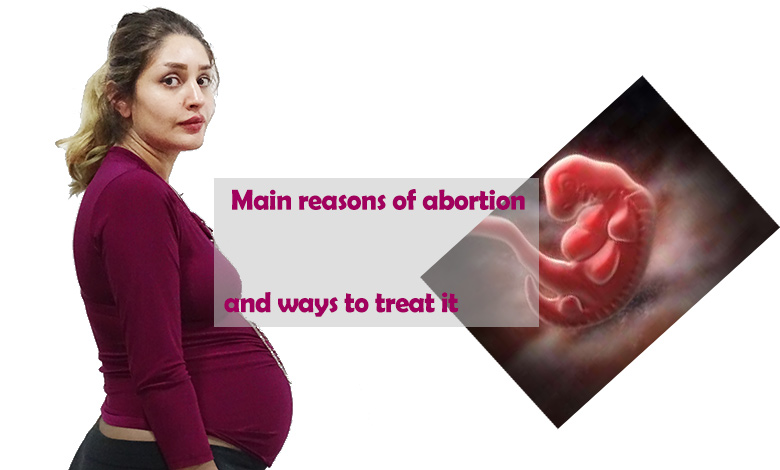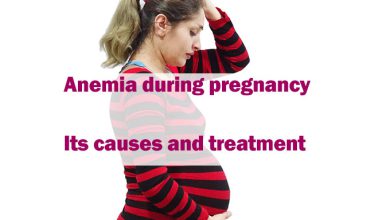7 main reasons of abortion and ways to treat it

From the point of view of medical science, the main causes of abortion or spontaneous termination of pregnancy and the related treatment modalities are different.
About 50% of pregnancies end before the woman knows she is pregnant, and about 15-25% of confirmed pregnancies end in miscarriage. Most miscarriages occur in the first 3 months, before the 20th week of pregnancy, and only 1% of miscarriages occur after this time.
Many causes of miscarriage can be investigated and controlled. Therefore, we recommend that you consult an online obstetrics and gynecologist before trying to get pregnant.
The 24-hour online website or application was able to provide the possibility of telephone, text, and voice counseling with the best doctors and experts in obstetrics and gynecology. In this article, we have generally mentioned the reasons for abortion and ways to treat it.
Related article: Flowing of the Foot in pregnancy causes, and treatment methods
7 main reasons for abortion
There are various reasons for abortion, some of the major ones are mentioned here:
Nearly half of the miscarriages that occur in the first trimester are caused by chromosomal abnormalities in the father’s sperm or mother’s egg. This problem can be hereditary or due to exposure to environmental factors such as X-rays or toxic substances.
Another major cause of miscarriage is cervical insufficiency. In this problem, the cervix cannot hold the fetus and miscarriage usually occur in the second trimester of pregnancy.
One of the important causes of abortion is maternal and fetal blood insufficiency. If the mother’s blood is Rh negative and the blood of the fetus is Rh positive, due to Rh-type incompatibility, an antibody is produced in the mother’s body which can cause disruption and abortion in subsequent pregnancies.
Hormonal irregularity, especially progesterone hormone, is another effective reason, which is usually caused by low egg quality. A mother suffering from hypothyroidism and diabetes can cause a miscarriage due to a lack of regulation of the body’s metabolism.
Your consultation with experienced doctors, especially the online doctor of abortion and infertility at Reception 24, can prevent the occurrence of many of these reasons and ultimately miscarriage. You can make an appointment with the abortion doctor at the 24-hour reception to see the doctor in person.
Ways to treat abortion
For each of the cases mentioned as reasons for abortion, there are specific treatment methods, which are:
If you’ve had two or more miscarriages, your doctor may ask you to do a genetic test to check your and your partner’s chromosomes and genes and rule out possible chromosomal abnormalities before trying to get pregnant.
During pregnancy, you may experience symptoms such as a sudden feeling of pressure in the abdomen, rupture of the water sac, and continuous bleeding, which in most cases is caused by uterine insufficiency or uterine cirrhosis. In these cases, after performing an ultrasound scan, the doctor closes the cervix with stitches to prevent miscarriage.

After taking a blood test and the doctor suspects blood deficiency in the mother and the fetus, in order to prevent the next miscarriage, the Regam ampoule is usually injected, which neutralizes the produced antibody.
For mothers whose doctor has noted a lack of the hormone progesterone after taking a blood test, progesterone compounds are injected at the beginning and during pregnancy to prevent miscarriage. Usually, before pregnancy, the mother is informed of her hypothyroidism and diabetes through a blood test, and the doctor allows the pregnancy after drug treatments.
abortion:
In most cases, bleeding is the first sign of a miscarriage. However, miscarriage can also occur without any bleeding or other symptoms being observed in the beginning. Many women prefer to use the term “missed pregnancy” instead of abortion. Missed pregnancy is very common in the first few weeks of pregnancy and this risk decreases as the pregnancy progresses.
In many cases, especially when the miscarriage occurs in the first days of pregnancy, it will be very difficult to find the cause. When we look at it as an expert, it’s really amazing when everything goes right.
Elizabeth Nowaki, a specialist in obstetrics and gynecology, says: “When we consider pregnancy as the starting point of human life, we realize that this event truly remains like a miracle. Two sets of genetic material meet and fuse together and then the cell divides, but things don’t always work out. “the easiest thing to do is to think that [abortion] is a kind of natural way of dealing with unhealthy fetuses who won’t be able to adjust to life after birth.”
Since many couples blame themselves after a miscarriage, we have to say that actually a small number of miscarriages can be prevented and doctors’ advice is to take care of your health before getting pregnant in order to have a successful and healthy pregnancy.
Dr. Zobel, an OB/GYN, says, “The best advice for women is to see an OB/GYN before pregnancy and do all necessary examination and tests, and to start taking prenatal vitamins 2-3 months before pregnancy.” pregnancy. Start taking all of your vaccinations, eating a healthy diet, and cutting out or minimizing caffeine.
It is recommended that you eliminate the use of stimulants. Even if you follow all of the above recommendations, you may not be able to prevent a miscarriage.
Causes of Abortion in the first months of Pregnancy
There are many causes of miscarriage in the first month of pregnancy, but the most important ones include:
1-Chromosomal abnormalities:
Among the most important causes of miscarriage in the first months of pregnancy are chromosomal problems. In fact, it can be said that the most important cause of abortion is the presence of defects in the chromosomes of the egg or sperm during the formation of the embryo. Although some chromosomal abnormalities are compatible with life (such as trisomy 21, which is one of the most common types of Down syndrome), other chromosomal abnormalities are not compatible with life.
2- Thyroid disorders:
Whether the thyroid is underactive or overactive, it causes infertility and is one of the causes of miscarriage in the first months of pregnancy. When the mother’s thyroid is underactive, her body tries to compensate for this deficiency by producing hormones, and these hormones actually block ovulation. On the contrary, in an overactive thyroid, high hormone production interferes with estrogen function and the uterus is disturbed for implantation and uterine bleeding occurs.
3-Diabetes:
Women who have diabetes problems must be under the supervision of a doctor and an endocrinologist to control their blood sugar levels. In pregnancies where the mother has insulin-dependent diabetes and it is not under control, there is a high probability of having a miscarriage or giving birth to a baby with birth defects.

If you have diabetes, it’s best to get it under control before you get pregnant to maximize your health. Disorders that are treated with medications, such as diabetes, hypothyroidism, hypertension, and autoimmune diseases, must be diagnosed and managed before pregnancy. These diseases, if detected in the early stages of pregnancy, are the key to a successful pregnancy in mothers who have chronic diseases.
4- Lifestyle:
Certain lifestyle habits, such as drug use, alcohol use during pregnancy, and smoking, increase the risk of early miscarriage and fetal loss. Paying attention to health reduces the risk of miscarriage. More than 50% of pregnancies are unplanned, which is why the mother is usually not ready for pregnancy. Most women usually do not know about their pregnancy until weeks after their period has been postponed. By that time, the fetus’s backbone has formed and its heart is beating.
Preparing for pregnancy, including diet control, exercise, minimizing stress and anxiety, managing chronic disease, and starting prenatal vitamins, is considered the best way to prepare for pregnancy. However, even these measures do not reduce the risk of miscarriage caused by chromosomal abnormalities.
Another lifestyle factor that increases the risk of miscarriage is living in the cities.
5-Physical problems:
It’s less common, but a large number of miscarriages can be due to physical problems in the mother, such as uterine abnormalities that include uterine wall polyps and cervical insufficiency, says Dr. Nowacki. He states that in many cases the loss of the fetus occurs due to a physical problem in the mother in the second or third trimester.
6- Blood coagulation disorders:
Another reason for miscarriage in the first months of pregnancy is coagulation problems. Miscarriages caused by this disorder (such as factor V Leiden) are rare but do occur. “I see a lot of patients with blood clotting problems, but it’s not as common as other causes,” explains Dr. Nowacki.
7-Immune system disorders:
Immune system disorders in women’s health are hotly debated, as much remains to be discovered about their association with miscarriage. But the American College of Obstetricians and Gynecologists believes that specific immune system disorders play a role in recurrent miscarriages. However, according to Dr. Nowaki, the precise role of immunosuppressive factors in miscarriage remains “complex and difficult.” The easiest way to understand it, he explains, is that “the body rejects pregnancy.”
Research has shown that the presence of some antibodies is the most common cause of recurrent miscarriages. Lupus (cutaneous tuberculosis) is one of the immune system diseases that increases the risk of miscarriage, often due to the antiphospholipid that these women carry with them. Up to 5% of women may have this antibody.
Any woman who experiences recurrent miscarriages (more than 3 consecutive miscarriages), sudden fetal death after 10 weeks, or preterm birth before 34 weeks should be tested for antiphospholipid antibody syndrome. You cannot control these antibodies. But if available, there are treatments to reduce the risk of miscarriage and pregnancy loss.
Now that you understand the reasons for miscarriage in the first months of pregnancy, most of them are out of your control and you shouldn’t blame yourself for it. Remember that this rarely happens again and you will most likely give birth to a healthy baby soon.
What are the 5 risk factors for a miscarriage?
What is the best treatment for a miscarriage?
What is the most common reason to miscarry?
How long can a miscarriage last?
Conclusion
In conclusion, abortion is a complex and sensitive issue that is influenced by various factors. Some of the main reasons why women may choose to undergo an abortion include financial instability, lack of access to contraception, health risks to the mother or fetus, and personal or societal pressures. However, it is important to note that abortion should not be considered a form of birth control.
There are various ways to treat abortion, including medical and surgical options. Medical abortion involves taking medication to terminate the pregnancy, while surgical abortion involves a procedure to remove the fetus from the uterus. Both methods have their own advantages and disadvantages and should be considered carefully by the patient in consultation with their healthcare provider.
Ultimately, it is important to provide women with access to comprehensive sexual and reproductive healthcare, including education and access to contraception, in order to reduce the need for abortion. Additionally, efforts should be made to address the underlying social and economic factors that may contribute to the decision to have an abortion.
